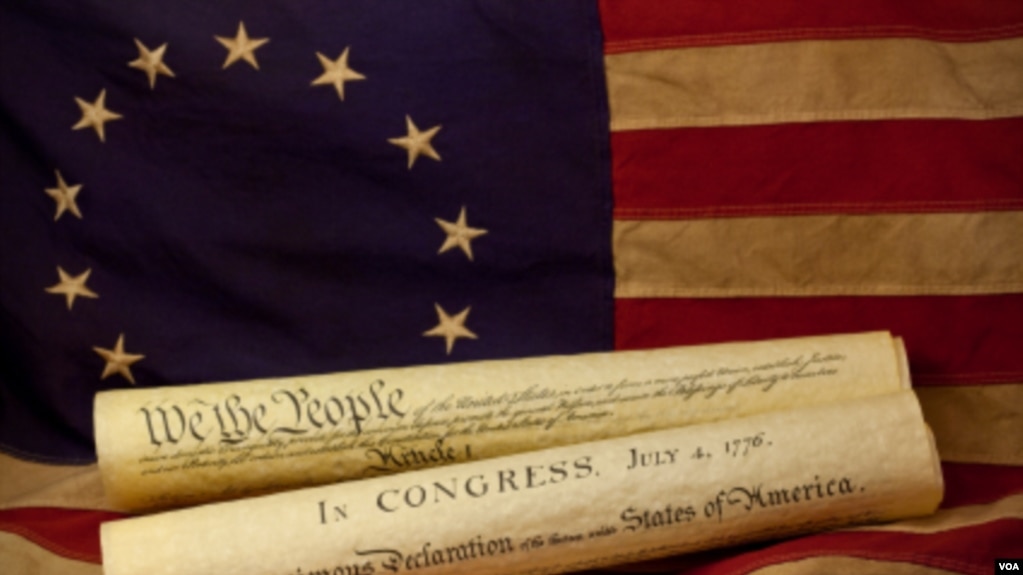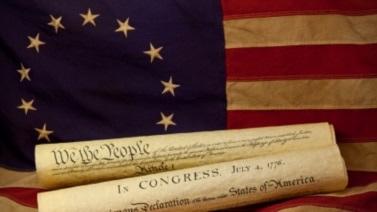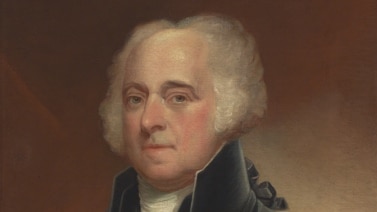
From VOA Learning English, welcome to THE MAKING OF A NATION – American history in Special English. I’m Steve Ember.
In 1796 the new nation held its third presidential election. George Washington won the first two elections without opposition. But 1796 saw a change in American politics. That year, for the first time, there was more than one candidate for president. There was also more than one political party. The Federalists were led by former treasury secretary Alexander Hamilton. And the Republicans were led by former secretary of state Thomas Jefferson.
John Adams was a Federalist. Most people expected him to win. He was well known throughout the country. He had campaigned for American independence from Britain. He had served as a diplomat in Europe and as the first American minister to Britain. He was George Washington's choice for vice president and had served in that position for both of Washington's terms.
But, unlike other Federalists, Adams was not loyal to Alexander Hamilton. So Hamilton worked against Adams. Hamilton tried to win support for his own candidate for president. His choice was another Federalist named Thomas Pinckney, from South Carolina.
At last, the day arrived for counting the votes of the electors. The Federalists were shocked by the results. Seventy-one electors voted for John Adams. Sixty-eight voted for Thomas Jefferson. Only sixty voted for Hamilton's choice, Thomas Pinckney.
Under the electoral system used at that time, the candidate with the most electoral votes became president. The candidate with the next largest number of votes became vice president. So America's second president would be John Adams, a Federalist, and his vice president would be Thomas Jefferson, a Republican.
Jefferson had resigned from public service a few years earlier. But he decided to accept his election as vice president. He wrote to his friend James Madison that he was willing to serve under Adams. Jefferson said he believed Adams was the only man who could stop Alexander Hamilton from becoming president in the next election in 1800.
To Adams himself, Jefferson wrote that he valued their long friendship and hoped it would continue. Republican newspapers carried articles that were friendly to Federalist John Adams -- the first time they had done so.
Adams and Jefferson took office in March 1797. However, some Federalists believed their party's power had come to an end. Adams was a Federalist. But, as we said, he was not loyal to the party's leader, Alexander Hamilton. Hamilton, sitting in his law office in New York City, did not lose hope. He knew he still controlled the top Federalist leaders in Congress.
More than that, he believed he knew how to control John Adams.
The new president made Hamilton's job easy. Adams kept George Washington's top advisers. The three men, who had served in Washington's cabinet, would now advise President Adams. Washington had appointed them at Hamilton's request. And they always did what Hamilton told them to do.
Historians still cannot explain why John Adams -- a man who did not like or trust Alexander Hamilton -- kept the three cabinet secretaries. If the secretaries had been men of great ability, then that might be an explanation. But they were not.
One was a secretary of state who knew very little about foreign relations. The second was a secretary of the treasury who knew even less about finance. And the third was a secretary of war who knew nothing about military matters and defense.
Adams may have kept these men as an act of party unity. Or he may have kept them because he could not get anyone else.
Whatever his reason, the decision was politically costly for Adams. The three cabinet secretaries worked together against him.
President Adams would tell his cabinet secretaries what he wanted. Then they would secretly go to Alexander Hamilton for their orders.
In the end, these secret activities helped destroy the Federalist Party. They also made the administration of John Adams one of the most important periods in the political history of the United States.
John Adams was born in the village of Braintree, Massachusetts, in 1735. He wanted to be a farmer. But he was sent to Harvard College to study to be a clergyman.
He had no interest in that career and became a lawyer, instead.
In the years before the American Revolution, John Adams wrote articles about the injustice of British rule. He also became a delegate to the First Continental Congress. He urged the Congress to appoint George Washington as commander-in-chief of the colonial armies. He argued for the creation of a Navy. And he helped develop the resolutions declaring America's independence.
“We think of George Washington in his famous farewell address urging Americans to give their loyalty to the United Sates, and to further its interests, and not to be loyal to some foreign country. And that was what Adams believed as well.”
John Ferling is a professor emeritus of history at the University of West Georgia. He has written many books about America’s founders, including John Adams. He says Adams wanted Americans to be able to govern themselves through their representatives.
“Adams was opposed to monarchies, and he was opposed to rule by hereditary nobility.”
Adams spent most of the Revolutionary War years in Europe. He helped win Dutch recognition of the new American nation. He also negotiated a loan from the Dutch government, as well as a treaty of friendship and commerce. After the Americans defeated British forces, he helped negotiate the peace treaty between the two countries. Then he served as the first American minister to Britain.
Adams was extremely intelligent and was a thoughtful, lively writer. However, John Ferling says Adams often acted very coldly and said little. Or he easily became angry.
“If you thought of adjectives to describe Adams, certainly you would think of words like captious, contrary, gruff, egotistical, short-tempered, whatever.”
But, he says, many people liked Adams after they got to know him. “He was certainly an excellent conversationalist, and he was filled with ideas. He wasn’t a vindictive person. He seemed to be a very honest person.”
(MUSIC)
His best friend was probably his wife, Abigail. They were married for almost 60 years. Joseph Ellis, a history professor at Mt. Holyoke College, wrote a book about their relationship.
“They’re the first power couple in American history. She has the greatest influence on foreign policy than any first lady up until probably Eleanor Roosevelt.”
Joseph Ellis says Abigail Adams did not see herself mainly as a hostess, even though she did lead social events. Instead, he says, the Adamses were a diplomatic team.
Another of John Adams' supporters was Thomas Jefferson. This was strange. Jefferson's political philosophy was opposed to everything Adams represented. And the two men did argue. But they were also friends. For the last years of their lives, Adams and Jefferson wrote letters to each other about their memories and about the future of the country. Perhaps Jefferson liked Adams because he respected him for his intelligence. Perhaps he never forgot that Adams had fought hard for American independence. Adams had given many years of his life to the young nation.
However, some people just did not like John Adams, but they knew they needed to work with him.
Federalist leaders, especially, appealed to Adams' weaknesses when they wanted his support. For example, they knew Adams was jealous of George Washington. Sometimes, if Adams knew Washington's opinion on a subject, he would purposely offer a different opinion.
Yet Washington -- like Jefferson -- respected Adams. He felt the new nation needed Adams' skills.
And John Ferling says Adams also respected George Washington, even though he thought Washington was not always fair to him.
Adams' last public appearance was before cadets from the United States Military Academy at West Point. He was a very old man by then. Someone had to help him walk. And, says historian John Ferling, Adams could not say more than a few sentences. “But what he did in that speech was, he exhorted those would-be officers to model themselves on George Washington and called Washington a great man.”
Adams' personal weaknesses caused other troubles during his presidency. He belonged to the Federalist Party, but he did not want to become involved in party arguments. And he did not want to make all the compromises necessary in the world of politics. So, other Federalists often worked against him.
Adams won the presidency in 1796. But his term would be difficult. His own party, the Federalists, did not trust him. And he did not have the support of the general public. The people knew he believed that men of money and position should govern America.
Even so, Adams did not expect the job of president to be easy. In politics, he said, a man must always walk on broken glass and red-hot iron. It is not easy to do this when you are not wearing shoes. But some men must do it. There are many dangerous things that have to be done for our country in these dangerous times. If nobody else will do them, he said, he will.
I'm Steve Ember, inviting you to join us again next week here on VOA Learning English as we continue the story of John Adams on THE MAKING OF A NATION -- American history in VOA Special English.

